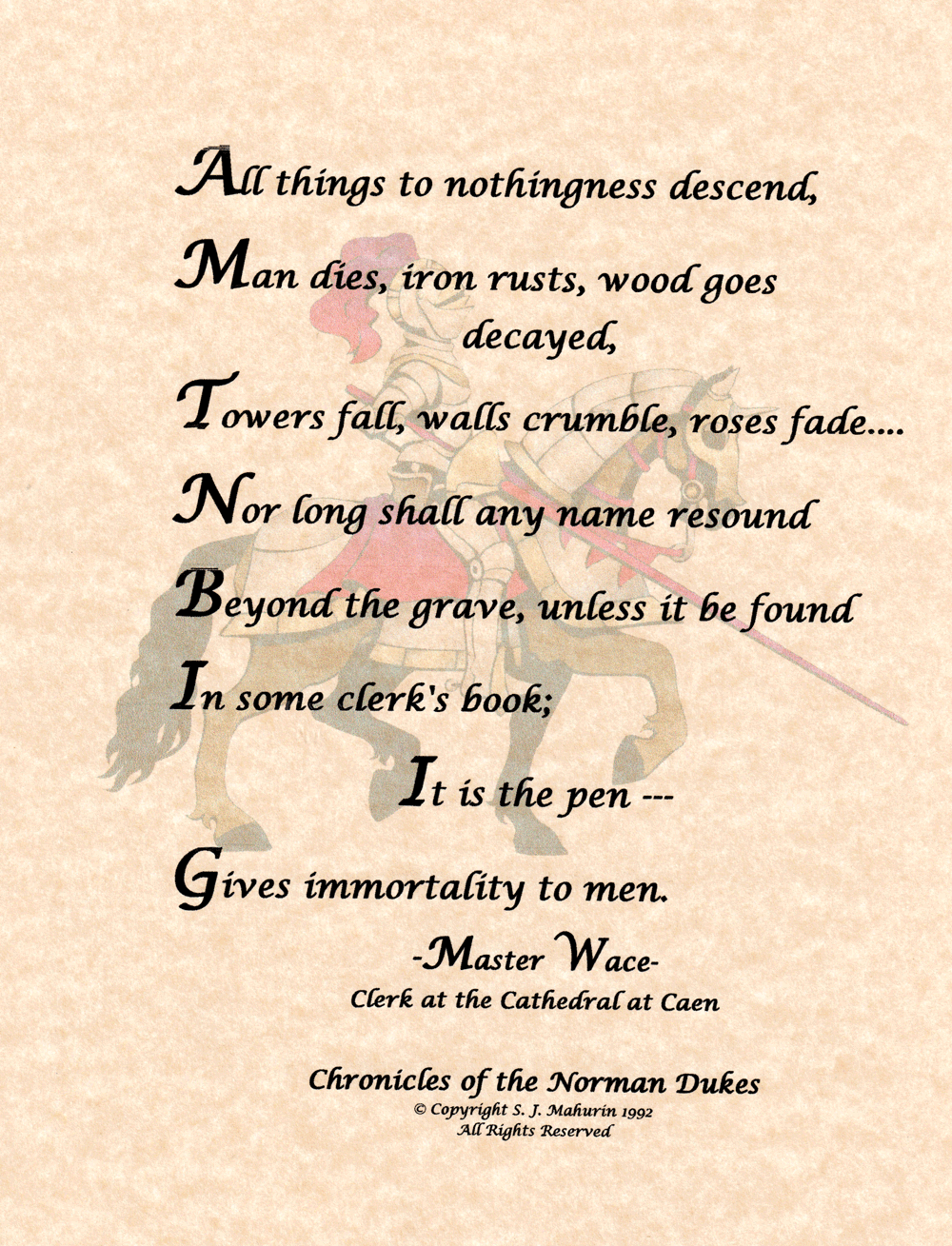A Woman's Place
Marjorie Ann George Patton
It was a man's world. You had to be strong as an oak, have nerves of steel, be a real man's man. Or did you? I was amazed when I began researching the mining industry to find out how many women were involved. Not just passively involved either! We all have pictures in our minds of the miner's wife at home with the children, keeping the house, dreading the times that came all too frequently when the whistle blew, long and loud, when it was not quitting time and she knew that somewhere in the mining field, an accident had happened. In our mind's eye we see her rushing out and to the site wondering if it was her husband who had been injured or killed and, if not, comforting others.
However, as I read about early day mining, and recalled stories of the members of my family who were miners, I found a good many women who were actively involved in the industry themselves. I knew a little lady in Peoria Oklahoma, named Clara Platter, who had worked in the mines there beginning when she was a girl of 13. She was an old lady when I knew her and used to tell us stories about her mining days. I had assumed she was an exception to the rule until I began reading old newspaper articles about other women who were involved in one way or another in the industry, though they were not always welcomed by their male counterparts. One man blamed a woman, who had come into the ground, for the deaths of several men in three different accidents that happened shortly after she had been there. This is a prime example of the superstitions that often crop up when people face danger.
Women then, as now, had to make a living when they were left to raise their families for one reason or another. Naturally, they wanted to work where they could make the best living. Early records showed that two women, one weighting 105 pounds and one weighting 129 pounds, were "coal heavers," their job was to shovel the coal from a railroad car into chute. For this backbreaking work they were paid 15 cents a ton.
Two women especially fascinated me as I looked into women's role in the mining industry. One was Mrs. M. E. Townley, a former southern belle, who had been raised in refinement by southern aristocrats and who found herself in need of making a living for she and her child. She was a person who had never even had to look after her own wardrobe but, when necessity demanded it, she became a business woman extra ordinaire. She started out in real estate in Texas and was lured to the Miami fields from California. She became the only woman mine president in this section of the country. Don't get the idea that she sat in a nice office and ran things from there, though. The president of the Miami Grant Mining Company was a "shirt sleeve operator." Information found tells of an incident when a reporter from the Miami Record- Herald, in making his rounds of the local mines, came to the Black Jack Mine on Spring River near Sunnyside. He asked to speak to the "Super" and was told he was not there, but the president of the company was in the ground and would be up shortly. He decided to wait and talk to him. Imagine his surprise when the gong rang and the cable rose out of the shaft, and as the can cleared the ground, standing atop the can holding onto the cable with one hand, was a beautiful young woman struggling with her other hand, to keep her wavy brown hair from blinding her. Other women had become real estate dealers, ran brokerage businesses, and at least one was a driller, but Mrs. Townley was the only woman who had succeeded in becoming the president of a mining company. Her lack of fear and the fact that she was not adverse to getting a little mud on her helped her to be an operator. An operator that knew what was going on in every part of the business from the work in the ground to the top office.
The other lady that particularly fascinated me was Mrs. O. J. Horn of Picher Oklahoma who was another "hands on" person. She appeared to be a woman of culture. She and her husband came to the area from Tennessee in 1917, with a small mule team which they contracted to haul ore from the shaft of the Mahutska to the mill. The Hornes "buddied" with each of them pulling a car of ore. Soon they figured out that they could hitch the team in tandem and pull two cars at once, so all Mrs. Horn had to do was the switching. This was not enough for so active a woman. Mr. Horn had learned how to run a hoist and taught his wife. She then became the only woman hoisterman in the world. The Miami Daily Record dated May 30 1918, states, "She handles the great steam hoist which shoots the ore cans from the railroad between the two shafts to the mill derrick with as much skill as any man in the field. She is ready at anytime to go into the derrick and pull from the ground for the hoists are just the same. Once, for a period of two weeks when her husband was suffering from a crushed foot, she handled his job and hers too both actually men's jobs, but she handled them well. She handled as many as 114 carloads of ore from the shaft and hoisted it to the mill each day."
A French lady, Mrs. Mary E. McPherson, who was a graduate of Heidelburg, Germany, was the manager of the Picher Hospital. When the hospital was built, people thought it was a nice thing for the town, but doubted it would ever be self supporting. However, from the start, practically all the rooms were occupied and by the month of March it had exceeded $12,000.00 in proceeds. It was a well equipped hospital and was a great success because it was close by when men were injured, saving them having to be transported for miles to other facilities. It was soon expanded and was "second to none," in this part of the state.
Another lady who figured largely in the health care of the miners and their families was Ruth Hulsman, mother of Miamian Janice Clay. She was first in the field in 1926. She was a self-sacrificing lady who cared for the miners and their families with love and understanding. There was no welfare in those days, so Mrs. Hulsman became the welfare department. She saw to it that children had such necessities as shoes and books as well as glasses and medical care. Sometimes she also had to rescue children from moral and physical harm. During depression days when people were desperate for money she sometimes found mothers training their daughters for prostitution. She worked in unbelievably depressing circumstances. She often took cripple children in her own car to Oklahoma City, or Tulsa, Oklahoma for treatment. When a Typhoid epidemic closed the school in 1926, she nursed the many sick. That same year there was an outbreak of smallpox and diphtheria. Another curse of the day was trachoma, an eye disease. With other nurses of the area and a doctor, she set up a hospital in the Ore Producers Building, with Army tents from Fort Sill. The doctor eradicated Trachoma from the district.
Other ladies in the mining district ran boarding houses and fed the men. They furnished good meals and a place to stay until the miners could send for their families and set up homes.
My own family came to Picher when my grandfather, with whom they lived and worked his farm, suddenly decided to sell the farm and agreed to be out in 30 days. My dad came ahead and got a job, but the only house he could find was a small two room house at a mill site. My mother used to tell about how she had to get rid of a lot things she needed because she did not have any place to put seven rooms of furniture in that small house. Daddy was night watchman a the mill and Mother was a home alone one evening when she heard someone stealing coal from the shed nearby that belonged to the mining company. She called out, asking who was there, and when she received no answer, she shot the gun out that direction intending to frighten away whoever it was, by shooting over his head. She did -barely. He must have straightened up about the time she fired and she blew the hat off his head !! She heard him running away and the next day the fellow bumped into my dad on the street and mentioned it to him, about his wife shooting at him. Without missing a beat, Daddy told him they were there to guard the place and that, if the guy knew what was good for him, he'd stay away because she might shoot lower next time."
Guess it didn't dawn on the man that they might object to him stealing from the company, when he told Daddy the story. Naturally, Mom was a little shook up when she learned she'd almost killed someone when all she meant to do was scare him off. But we believe it taught the guy a lesson that I doubt he ever forgot. Needless to say they had no more problems with stealing.

